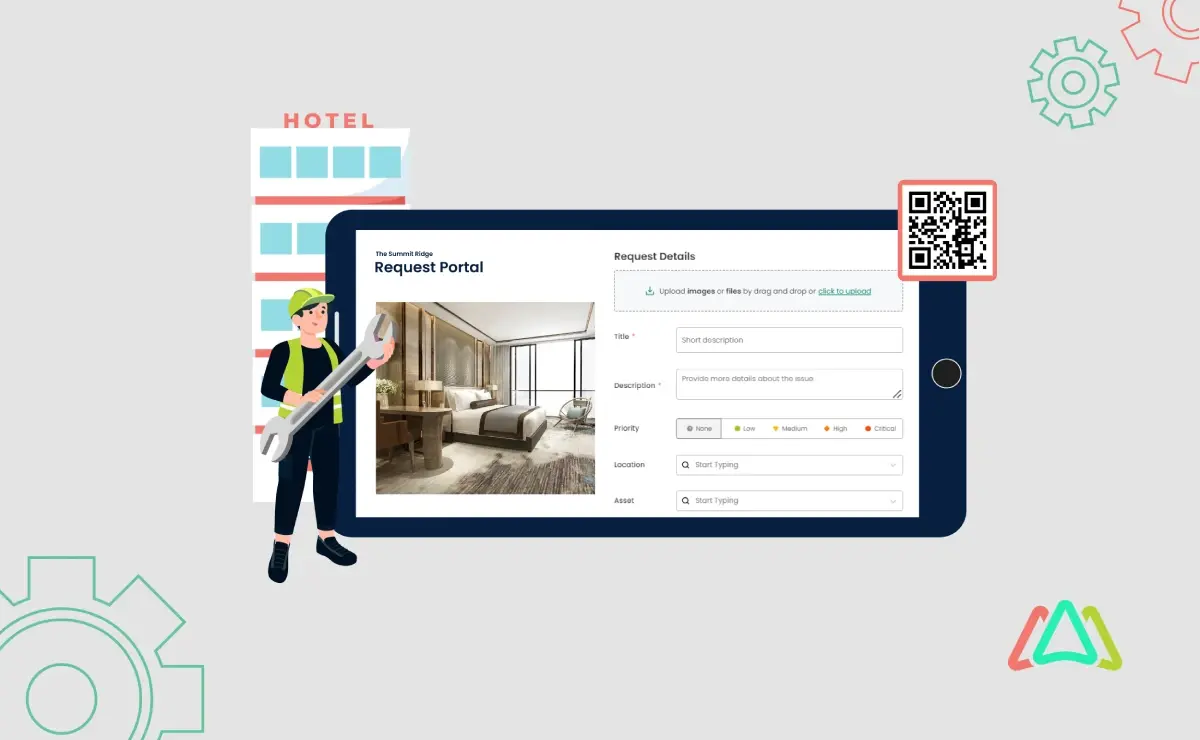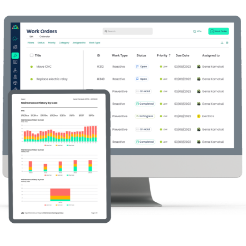
Utilizing a CMMS System to Ensure Maintenance Accountability and Enhance Guest Satisfaction in Hotels
Introduction
Efficient maintenance operations are crucial for ensuring hotel guest satisfaction. With Computerized Maintenance Management Systems (CMMS), hotels can streamline maintenance processes, improve maintenance accountability, and ultimately enhance the overall guest experience. From reducing downtime to prolonging the lifespan of equipment, CMMS offers a wide range of benefits that make it a preferred choice for hotel maintenance management.
Here, we'll explore the importance of CMMS in the hospitality industry and why hotels are increasingly turning to its software to ensure the highest levels of guest satisfaction.
Importance of CMMS in the Hospitality Industry

CMMS plays a vital role in the hospitality industry by ensuring that all equipment and facilities are adequately maintained to meet customers' high standards. From HVAC and plumbing systems to kitchen appliances, every piece of equipment in a hospitality establishment must function at its highest level to provide guests with a comfortable and enjoyable experience.
A CMMS helps streamline maintenance processes by scheduling routine inspections, tracking work orders, and managing spare parts inventory. For example, in hotels, a CMMS can help maintenance staff track when HVAC systems need to be serviced, kitchen equipment needs to be inspected, plumbing issues are reported, and rooms must be deep cleaned. A CMMS ensures that all equipment is maintained correctly and reduces the risk of unexpected breakdowns that could inconvenience guests.
Additionally, a CMMS software can help hospitality establishments save time and money by automating maintenance tasks and reducing the need for manual record-keeping. With the software, maintenance team members can trade in paper maintenance work orders and reports for a centralized system that can manage all maintenance activities, including easily accessing information about equipment maintenance history, work orders, and spare parts inventory. A CMMS improves efficiency, allows staff to respond to maintenance requests, and minimizes downtime quickly.
Beyond these specifics, a CMMS is essential for maintaining high service and cleanliness standards in the hospitality industry. By effectively managing equipment maintenance, hospitality establishments can ensure that guests have a positive experience and continue to return for future visits.
Furthermore, CMMS software provides valuable data and analytics on equipment maintenance and performance history, allowing businesses to make informed decisions on equipment upgrades, replacements, and overall maintenance strategies. This proactive approach can result in significant cost savings, improved operational efficiency, and a better guest experience, making it an attractive investment for decision-makers in the hospitality sector.
In the competitive hospitality industry, where reputation and customer satisfaction are paramount, investing in a robust CMMS system can be a wise decision for businesses looking to maintain a high standard of service and stay ahead of the competition.
Key Features of CMMS for Improving Guest Experiences
Utilizing a CMMS can be a game-changer for improving guest experiences in a hospitality or service industry setting. With a CMMS, you can track maintenance issues, manage work orders, and optimize asset performance to ensure that your facilities are always in top-notch condition for your guests.

Key features of a CMMS that can help improve guest experiences include preventive maintenance scheduling, mobile accessibility for on-the-go monitoring and reporting, inventory management for efficient repairs and replacements, and detailed reporting and analytics to identify trends and areas for improvement. By leveraging these features, maintenance managers can proactively address maintenance issues before they impact the guest experience, leading to higher satisfaction rates, repeat business, and positive reviews.
Furthermore, by tracking and managing work orders efficiently, maintenance managers can prioritize and assign tasks quickly to resolve issues promptly. CMMS's work order management feature helps prevent guest complaints and maintain a positive reputation for your business.
Another critical feature of a CMMS that can enhance guest experiences is the ability to streamline communication and collaboration among your maintenance team. Using a centralized platform for all maintenance-related tasks, a team can easily communicate about ongoing issues, share updates, and coordinate efforts to resolve problems effectively. Improved communication and collaboration lead to more efficient problem-solving, ensuring that maintenance tasks are completed promptly and minimizing disruptions to guest experiences.
A CMMS's inventory management also allows you to track spare parts and equipment needed for maintenance and repairs. This feature ensures that your team has the resources to quickly address any issues, preventing downtime and ensuring your facilities operate smoothly for guests.
Utilizing a CMMS in a hospitality or service industry setting can significantly enhance guest experiences by improving maintenance efficiency, streamlining communication, and ensuring that your facilities are always in top condition. Utilizing a CMMS's essential features, maintenance managers can create a positive and memorable guest experience, increasing customer satisfaction and loyalty.
CMMS Benefits for Hotel Maintenance

One key benefit of using a CMMS system in hotels is the ability to assign and track maintenance. By quickly delegating tasks to specific technicians or teams, hotel managers can ensure that maintenance work is promptly addressed and completed on time. This approach helps prevent minor maintenance issues from escalating to extensive and more costly problems.
Additionally, CMMS systems allow for easy tracking of maintenance history and costs. This data can be analyzed to identify trends and patterns, helping hotels make proactive maintenance decisions and avoid expensive breakdowns. By carefully monitoring maintenance costs, hotels can better allocate their budget and resources for maximum efficiency.
Another important aspect of using a CMMS system in hotels is the ability to schedule preventive maintenance tasks. By setting up automatic reminders for routine maintenance checks, hotels can prolong the lifespan of their equipment and reduce the likelihood of unexpected breakdowns. Utilizing automatic timers helps improve operational efficiency and enhances guest satisfaction by minimizing disruptions during their stay.
Furthermore, CMMS systems offer real-time visibility into maintenance operations, allowing hotel managers to track the progress of maintenance tasks and monitor technician performance. This transparency promotes accountability among maintenance staff and helps ensure that work is completed to a high standard. By fostering a culture of accountability, hotels can maintain a consistent service quality and enhance guest satisfaction.
How CMMS Can Enhance Hotel Guest Satisfaction
The following are specific ways a CMMS can enhance guests' hotel experience:
Preventive maintenance scheduling:
CMMS software helps hotels manage preventive maintenance tasks for guest rooms, common areas, and facilities. By proactively addressing maintenance issues, hotels can prevent breakdowns and inconveniences for guests, leading to a more comfortable stay.
Quick response to guest requests:
With CMMS software , maintenance teams can receive and react to requests in real time. Their responsiveness allows them to prioritize and promptly address requests, ensuring guests have a positive experience and feel valued.
Increased facility efficiency:
CMMS software can help track the performance of equipment and facilities, allowing for better resource allocation and cost management. By ensuring that guests are at their best, hotels can provide them with a seamless and enjoyable experience.
Enhanced safety and security:
Regular maintenance checks and inspections scheduled within a CMMS can help identify and address safety and security risks on time. By maintaining a safe environment for guests, hotels can build trust and loyalty among their guests.
Improved communication and collaboration:
CMMS software can enable better communication and cooperation between different departments within a hotel, leading to more efficient and effective maintenance processes. Optimal communication can result in quicker issue resolution and a smoother guest experience overall.
Overall, CMMS can enhance guest satisfaction by ensuring well-maintained facilities, prompt response to guest requests, and a seamless and enjoyable experience for guests. Hotels that invest in CMMS software can benefit from improved efficiency, cost savings, and increased guest loyalty.
Best Practices for Implementing CMMS in a Hotel Setting

To ensure a successful implementation, following best practices tailored to the hospitality industry's unique challenges and requirements is essential. Here are some noteworthy best practices to follow:
- Conducting a thorough assessment of a hotel's maintenance needs and requirements is crucial. An assessment should include identifying critical assets, maintenance schedules, and any existing maintenance processes that can be improved with a CMMS. Once an evaluation is complete, it is essential to select a CMMS system that is user-friendly, customizable, and scalable to meet a particular hotel's needs.
- Establish transparent processes and workflows for maintenance tasks, work order management, inventory management, and reporting must be established. Staff training in using the system effectively is essential to ensure successful implementation and adoption.
- Regularly monitoring and analyzing key performance indicators (KPIs) related to maintenance activities can help identify areas for improvement and optimize maintenance processes over time. The insights from this data will inform maintenance managers about how to update and maintain the CMMS system to ensure its continued effectiveness and reliability.
- Encourage communication and collaboration between maintenance staff, housekeeping, catering, the front desk, and other facility departments. These efforts are crucial for the success of the CMMS implementation. This strategy will ensure all stakeholders are on the same page and working towards common goals.
- Integrate the CMMS system with other hotel management software, such as property management systems (PMS) or energy management systems. This will streamline maintenance operations and provide a holistic view of maintenance activities across the hotel.
- Regularly seeking feedback from staff and stakeholders throughout the implementation process and making necessary adjustments based on their input will help ensure a smooth transition and drive the success of the CMMS system in improving maintenance operations in the hotel setting. Following these best practices, hotels can implement a CMMS system to optimize maintenance operations and deliver a superior guest experience.
By following these best practices for implementing a CMMS in a hotel setting, you can maximize the benefits of this technology and improve your hotel's overall maintenance operations and guest satisfaction.
Case Studies of Successful CMMS Implementations in Hotels
Case studies of successful CMMS implementations in hotels can provide valuable insights for other hotel operators looking to improve their maintenance management processes. By examining how other hotels have successfully implemented and utilized CMMS software, hotel owners and managers can learn best practices and strategies for optimizing maintenance operations.
One example of a successful CMMS implementation in a hotel is The Ritz-Carlton, which saw a significant improvement in its maintenance efficiency and cost savings after implementing a CMMS system. The Ritz-Carlton was able to streamline its maintenance processes, reduce downtime, and improve guest satisfaction by centralizing all maintenance requests, work orders, and equipment information in one platform.
Another case study to consider is Marriott International, which implemented a mobile CMMS solution to empower its maintenance teams to access real-time information and communication tools on the go. The CMMS mobile feature enabled Marriott to respond to maintenance issues more quickly and efficiently, improving operational performance and guest experiences.
These case studies highlight the many benefits hotels can achieve through successful CMMS implementations, such as increased productivity, cost savings, and enhanced guest satisfaction.
Conclusion
Investing in a CMMS system is crucial for ensuring guest satisfaction in the hospitality industry. By streamlining maintenance processes and ensuring that equipment is always in top condition, hotels can provide a better experience for their guests.
Additionally, CMMS systems can help reduce downtime and minimize disruptions, ultimately leading to increased efficiency and cost savings for the hotel. Investing in a CMMS system is an intelligent decision that significantly benefits the hotel and its guests.
To learn more about how CMMS can benefit your business, contact us today to book a consultation. Remember to follow our blog for the latest industry insights and updates.
TABLE OF CONTENTS
Keep Reading
Ever find yourself checking into a luxury hotel and expecting a relaxing stay, only to find a ...
11 Apr 2025
Organizations are witnessing swift changes in the business environment and confronting a ...
8 Apr 2025
Last month, news outlets and the entire internet was abuzz with the return of NASA astronauts ...
3 Apr 2025
What comes first - CMMS or predictive maintenance? If your answer is either, it is correct. ...
28 Mar 2025
Artificial intelligence (AI) talk has become commonplace. Today, engaging in business-focused ...
27 Mar 2025
Imagine a world where machines predict, diagnose, and fix their issues before they fail. This ...
25 Mar 2025
A facility maintenance plan is at the core of a facility’s operations. This organized ...
21 Mar 2025
Think of managing your maintenance operations like managing a championship sports team. Just ...
21 Mar 2025
The maintenance sector is battling a severe talent shortage that threatens to undermine ...
7 Mar 2025
Manufacturing maintenance is the backbone of industrial efficiency, ensuring machines run ...
5 Mar 2025
No one likes playing a guessing game when equipment breaks down. Yet, maintenance teams often ...
4 Mar 2025
The size of the preventive maintenance software market is discussed in millions of dollars, ...
4 Mar 2025
The organizational structure and corporate hierarchy vary from company to company. Large ...
28 Feb 2025
Maintenance procedures are essential for ensuring the longevity and reliability of machinery ...
21 Feb 2025
Sustainability is no longer just a buzzword; it's a critical component of corporate social ...
20 Feb 2025
A Computerized Maintenance Management System (CMMS) relies on accurate, well-organized data ...
18 Feb 2025
In an era where technology drives operational efficiency, Computerized Maintenance Management ...
14 Feb 2025
A Computerized Maintenance Management System (CMMS) is a key component of modern maintenance ...
13 Feb 2025
Introduction Maintenance management is the foundation of maintenance operations in industries ...
11 Feb 2025
Introduction A Computerized Maintenance Management System (CMMS) is software designed to help ...
7 Feb 2025






